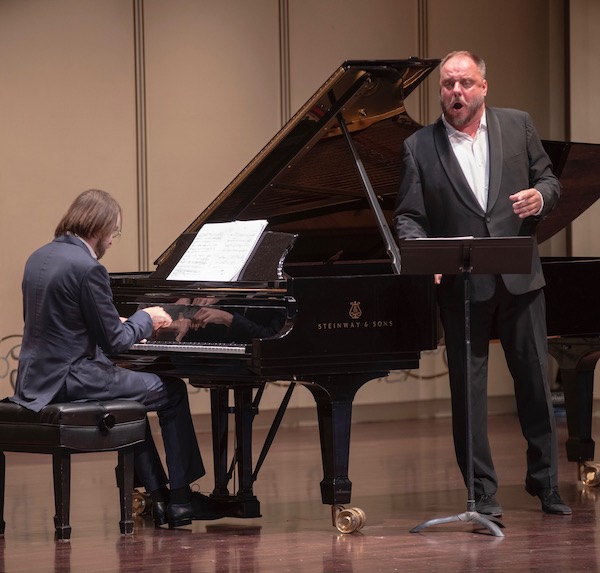Goerne, Trifonov bring simpatico artistry to dark songs at Ravinia

One heartening constant in the wayward artistic fortunes of the Ravinia Festival has been the vocal recitals of Matthias Goerne. For nearly a decade, the German baritone has brought the finest of lieder and song cycles to Highland Park in compelling, often revelatory concerts.
Goerne returned to Ravinia’s Martin Theatre Monday night with no less than Daniil Trifonov, the leading young pianist of our day, as his keyboard partner.
The program was not a light-hearted frolic, even by the somber nature of the German lieder that predominated: a Schumann cycle flanked by almost unrelievedly bleak songs of Berg, Wolf, Shostakovich and Brahms. Winterreise suddenly seemed like “I Feel Pretty.”
Performing the 75-minute program straight through with no interval and only fractional pauses between sets may have helped to sustain mood and concentration but it also tended to emphasize the invariant expressive profile of the thirty songs.
Alban Berg’s Four Songs, Op. 2, opened the recital and set the gloom-laden tone for the evening. Trifonov led off with a stately tempo for the first song “Dem Schmerz sein Recht,” and Goerne starkly conveyed the unsettling drama and mystery of these death-haunted settings. The baritone brought daunting force to the climax of “Warm die Lüfte,” with Trifonov’s keyboard work equally powerful.
Goerne has teamed with excellent pianists in his Ravinia recitals. But having the young Russian phenom as partner made this more of an equal occasion and took the performances to a whole other level. There was none of the subtle deference usually accorded singers in vocal recitals; Trifonov’s muscle, bracing articulation and seamless polish was just as forthright and commanding as Goerne’s vocalism.
Yet his playing was never aggressive or merely flashy, nor did he ever swamp his colleague. Trifonov’s piano was deftly balanced throughout and his range of dynamics and expressive nuance was as wide as that of Goerne.
The simpatico partnership between the two men was most striking in Schumann’s Dichterliebe.
The 16-song cycle reflects the protagonist’s nostalgic longing for a lost beloved. The settings segue from hypersensitive reactions to flowers and birds that evoke her memory to a bleak finale in which he tells of putting all his sorrow and pain into a huge coffin and throwing it into the sea.
Goerne’s voice has grown in strength and weight over the years. The cycle’s dramatic outbursts—as in “Im Rhein, im heiligen Strome” and “Ich grolle nicht”—were searing in their stentorian impact.
Yet the singer has maintained his flexibility and tonal sweetness, and Goerne communicated the sadness and gentle regret of the inward moments. In “Aus alten Marchhen winkt es” the singer brought a hearty swagger to the opening verses, turning to melancholy longing in the final stanza.
There was a cumulative flow to Schumann’s cycle, with Trifonov’s keyboard work so fluid and inevitable one would hardly know where one song ended and the next began without looking in the program.
Indeed, Trifonov’s playing was extraordinary throughout, not least in his sensitive solo moments. Both artists rose to the enigmatic final song “Die alten, bösen Lieder” with a sense of epic scale and intimate tragedy. Trifonov’s tenderly expressive postlude made a fitting coda to the duo’s impassioned performance.
Two sets of songs on Michelangelo texts followed.
Perhaps here the composers’ divergent styles could have been more sharply delineated. Still, Goerne brought brooding power to Hugo Wolf’s despairing Three Michelangelo Songs and an echt-Slavic bass sonority to three equally inconsolable excerpts from Shostakovich’s Suite on Verses by Michelangelo. Trifonov’s postlude in “Smert” (Death) was just as evocative.
Even music of Brahms offered little relief from the downbeat theme with his Four Serious Songs set to some of the most pessimistic of Biblical verses.
Here too, Goerne’s commitment and emotional range were no less arresting. Throughout the recital, not only in his vocalism but in his stage presence—with the singer’s restless swaying and graceful-awkward movements—Goerne seemed to embody the haunted essence of the texts.
The enthusiastic ovations and repeated curtain calls brought an apt encore, with Goerne offering Bach’s “Bist du bei mir.” Sung with simple, touching sincerity, Bach’s aria seemed to offer a slender ray of hope out of the evening’s heart of darkness.
The Ravinia Festival continues with Rafael Payare conducting the Chicago Symphony Orchestra in Beethoven’s Symphony No. 5 and Brahms’ Piano Concerto No. 1 with Yefim Bronfman 8 p.m. Thursday. ravinia.org
Posted in Performances





Posted Aug 05, 2019 at 1:17 pm by Matt
Thanks, the review captures what I heard.